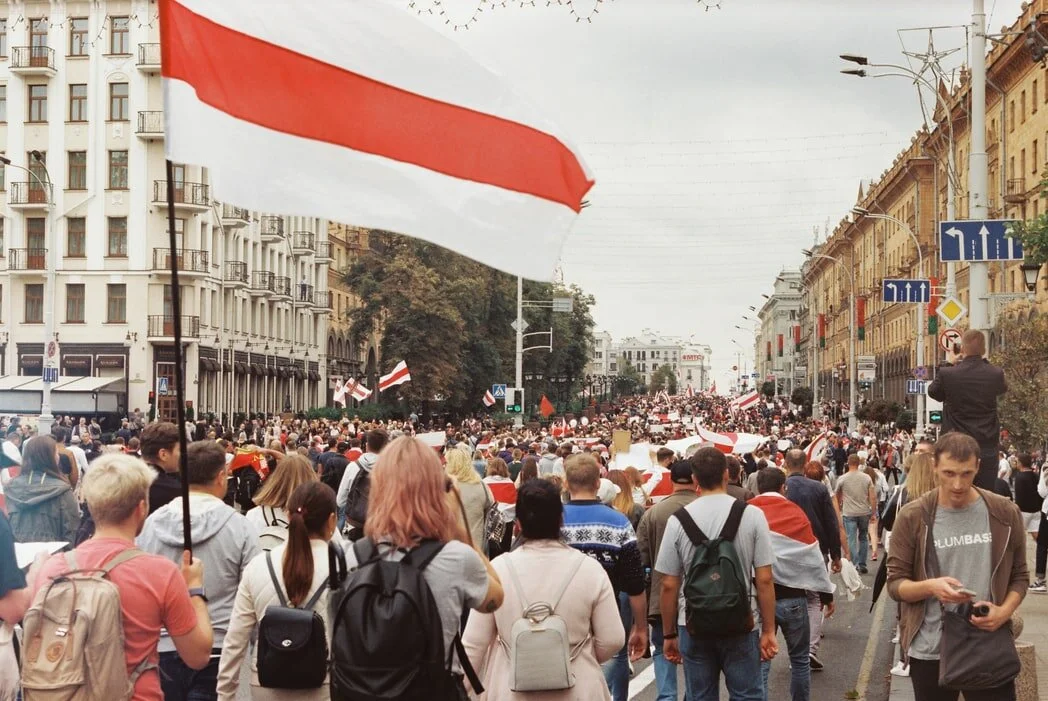Belarus Divided: The Impact of Tikhanovskaya’s Campaign for Democracy on EU-Belarusian Relations
While the world was watching the US presidential elections with bated breath, a political turmoil unfolded in Belarus that was no less contentious. After decades of totalitarian rule, the unprecedented public challenge to Alexander Lukashenko’s legitimacy may finally put an end to his political hegemony in Belarus – and this time, even his attempts to secure Russian assistance may not be enough to save him. Meanwhile, adversary Svetlana Tikhanovskaya’s efforts to mobilize the European Union into addressing Lukashenko’s acts are placing Belarus in a precarious position, torn between ties of Russian allegiance as a former Soviet state and dependence on EU support to one day become a self-sufficient capitalist democracy free from Russia’s influence.
Since the outcome of this summer’s elections, supposedly won by Lukashenko with an overwhelming majority, the public’s dissatisfaction with the regime has been difficult to ignore. Those gathered in Minsk would have preferred to see a different candidate emerge successful: Svetlana Tikhanovskaya, transformed from a last-minute replacement of her interned husband, the original opposition candidate, to a popular symbol of the Belarusian struggle for democracy. The state-sanctioned election result, allocating Tikhanovskaya just a tenth of the total votes, does not reflect the nation-wide loyalty for the democratic activist. This has led to accusations that the election was corrupt and Lukashenko’s presidency invalid; an opinion supported by the European Union. Now in the safe haven of Lithuania, Tikhanovskaya has assumed responsibility for the organised resistance against Lukashenko’s oppressive and autocratic rule – and Europe is part of her master plan.
Tikhanovskaya’s visits to the European Parliament demonstrate the mounting complexity of the European Union’s relationship with Belarus. On the one hand, the EU is showing an increasing willingness to penalize Belarus for the dishonest dealings of its authorities and ruthless oppression of the resistance movement. Dozens of major Belarusian executives have been barred from entering the EU until European demands are met for more humane treatment of demonstrators and acquittal of citizens who have already been arrested. Moreover, ambassadors of various European countries have left Belarus in protest after Polish and Lithuanian ambassadors were told by the Belarusian authorities that they were no longer welcome. The continued brutal quashing of public demonstrations has led to open condemnation of the regime’s actions by the European Union, increasing the tensions between Belarus and major European powers. In addition, the economic assistance previously allotted to the Belarusian state by the EU is to be reduced. It would seem, then, that Belarus is slipping away from any potential closer relationship with the European Union that would have enabled it to escape Russia’s grasp.
Yet the EU’s overt support for Tikhanovskaya has shown an increased European involvement in Belarusian affairs and a renewed determination to liberate the Belarusian people from Lukashenko’s violent and undemocratic rule. In her tireless campaign for a more fair and transparent election in Belarus, Tikhanovskaya has not only appealed to the EU at large but shown a marked interest in collaborating with individual European leaders. French president Emmanuel Macron is among those to have pledged assistance to Tikhanovskaya’s cause. Tikhanovskaya also appears to be building a close rapport with Germany, attending conferences with both Angela Merkel and Heiko Maas. Apparently, the EU is assuming a double policy reflecting the two faces of Belarus – while Tikhanovskaya edges closer to a formal alliance between the Belarusian opposition and major European state officials, Lukashenko seems determined to avert all prospects of European assistance through his endorsement of state-sanctioned violence and corrupt governance.
However, there is another factor pushing Lukashenko’s regime further away from European beneficence. Collaboration between Lukashenko and Putin has aroused both European suspicions and Belarusian resentment as Belarus risks being swallowed up by Russia. Over twenty years ago, the two countries made plans for unification summarized in the Union State contract. The agreement is causing considerable tensions today, with Russia urging its speedy enforcement and Lukashenko desperately trying to retain Belarusian autonomy. Moreover, Belarusian dependence on Russia for fossil fuels and financial contributions as well as the presence of Russian army bases in Belarus mean this is certainly not an alliance of equal powers.
It would be wrong, then, to assume that Russia and Belarus always see eye to eye. But when it comes to the presidential elections, it is clear whose side Russia is on. The Russian media acknowledge a firm belief in Lukashenko’s right to retain his position, while Tikhanovskaya’s refusal to promise continued Belarusian membership of the Union State in the case of regime change is unlikely to make the opposition leader popular with Russian politicians.
Despite the strain the Union-State conflict has imposed on relations with Russia, Lukashenko’s Belarus remains both closely allied to modern-day Russia and indebted to its Soviet past for many of its economic policies. For instance, the regime continues to oversee much of Belarusian industry in remembrance of the socialist ideal of the state-regulated economy. It is therefore unsurprising that Russia is disinclined to loosen its grip on one of the final reminders of its Soviet past.
The dispute between Lukashenko and Tikhanovskaya has torn European loyalties in two, both bringing European officials closer to overt support of the Belarusian resistance and forcing them to exert increasing pressure on the official Belarusian authorities. Until Belarusian political representation reflects the true sentiments of the populace, there can be no unified European policy towards this divided country. The US presidential elections may be over, but it remains to be seen who will win the Belarusian vote.
Image courtesy of Andrew Keymaster via Unsplash, ©2020, some rights reserved.



